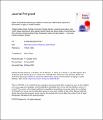Sprint and endurance training in relation to redox and inflammatory status and biomarkers of aging in master athletes
Rosa, T. S., Neves, R. V. P., Deus, L. A., Sousa, C. V., da Silva Aguiar, S., de Souza, M. K., Moraes, M. R., Rosa, É. C. C. C., Andrade, R. V., Korhonen, M. T., & Simões, H. G. (2020). Sprint and endurance training in relation to redox and inflammatory status and biomarkers of aging in master athletes. Nitric oxide-biology and chemistry, 102, 42-51. https://doi.org/10.1016/j.niox.2020.05.004
Published in
Nitric oxide-biology and chemistryAuthors
Date
2020Discipline
Gerontologian tutkimuskeskusHyvinvoinnin tutkimuksen yhteisöGerontology Research CenterSchool of WellbeingCopyright
© 2020 Elsevier Inc. All rights reserved.
Purpose Studies have shown a positive influence of intense athletic training on several biomarkers of aging, but it remains unclear whether this influence is dependent of exercise-training-mode. This study compared redox balance, cytokine levels and biomarkers of aging between master sprinters and endurance athletes, as well as in young and middle-aged individuals as controls. Methods Participants were male master sprinters (SA, 50±8.9yrs; n=13) and endurance runners (EA, 53±8.2yrs; n=18) with remarkable athletic experience (∼25yrs of practice), besides untrained young (YC, 22.7±3.9yrs; n=17) and age-matched controls (MC, 45.5±9.8yrs; n=12). Anamnesis, anthropometrics, biomarkers of aging, inflammation status and oxidative stress parameters were analyzed in all participants. Results An increased pro-oxidant activity (elevated protein carbonyl; isoprostanes and 8-OHdG) was observed for MC in comparison to remaining groups (p<0.05). However, SA presented a better antioxidant capacity than both MC and EA, while nitrite/nitrate (NOx) availability was higher for EA and lower for the MC (p<0.05). Both groups of athletes presented a better anti-inflammatory status than MC (increased IL-10 and lowered IL-6, sIL-6R, sTNF-RI), but worse than YC (increased TNF-α, sTNF-RI, and sIL-6R) (p<0.05). Telomere length was shorter in MC, which also had lower levels of irisin and klotho, and elevated FGF-23 (p<0.05). ADMA levels were higher in MC and SA, while irisin was lower in EA when compared to SA and YC (p<0.05). Conclusion Master athletes presented better redox balance and inflammatory status, with decreased biomarkers of aging compared to control. Regarding exercise mode, a better NO- profile, as a marker of endothelial function, was observed for EA, whereas SA had a better redox balance, cytokines profile and attenuated biomarkers of aging. ...
...
 ...
...
Publisher
ElsevierISSN Search the Publication Forum
1089-8603Keywords
Publication in research information system
https://converis.jyu.fi/converis/portal/detail/Publication/36044076
Metadata
Show full item recordCollections
- Liikuntatieteiden tiedekunta [3141]
Additional information about funding
This study was financed in part by the Coordenação de Aperfeiçoamento de Pessoal de Nível Superior - Brasil (CAPES) - Finance Code 001 and received grants from the Fundação de Apoio à Pesquisa do Distrito Federal (FAP/DF): Demanda Espontânea – Edital 03/2015 and Demanda Espontânea – Edital 04/2017.License
Related items
Showing items with similar title or keywords.
-
Relationship between inflammatory biomarkers and testosterone levels in male master athletes and non-athletes
Pinheiro Barbosa, Luca; da Silva Aguiar, Samuel; Anderson Santos, Patrick; Rosa dos Santos, Thiago; Alves Maciel, Larissa; Alves de Deus, Lysleine; Vanerson Passos Neves, Rodrigo; Lopes de Araújo Leite, Patrício; Duarte Gutierrez, Sara; Victor Sousa, Caio; Korhonen, Marko T.; Degens, Hans; Gustavo Simões, Herbert (Elsevier, 2021)Background Aging is often associated with low-grade systemic inflammation and reduced anabolic hormone levels. To investigate whether lifelong exercise training can decrease the age-related low-grade inflammation and ... -
Inflammatory Biomarkers in Elite Cross-Country Skiers After a Competition Season : A Case-Control Study
Luoto, Raakel; Ruuskanen, Olli; Ihalainen, Johanna K.; Pekkala, Satu; Hintikka, Jukka; Kanerva, Noora; Waris, Matti; Heinonen, Olli J.; Valtonen, Maarit (Springer, 2023)Purpose Whether elite athletes, who have been exposed to vigorous-intensity exercise combined with other stressors, have elevated systemic low-grade inflammation, remains largely unclear. To address this question, we ... -
The Effects of Acceptance and Commitment Therapy (ACT) Intervention on Inflammation and Stress Biomarkers : a Randomized Controlled Trial
Järvelä-Reijonen, Elina; Puttonen, Sampsa; Karhunen, Leila; Sairanen, Essi; Laitinen, Jaana; Kolehmainen, Mikko; Pihlajamäki, Jussi; Kujala, Urho M.; Korpela, Riitta; Ermes, Miikka; Lappalainen, Raimo; Kolehmainen, Marjukka (Springer, 2020)Background Psychological processes can be manifested in physiological health. We investigated whether acceptance and commitment therapy (ACT), targeted on psychological flexibility (PF), influences inflammation and stress ... -
Effects of a 6-month dual-task, power-based exercise program on cognitive function, neurological and inflammatory markers in older adults : secondary analysis of a cluster randomised controlled trial
Tait, Jamie L.; Duckham, Rachel L.; Rantalainen, Timo; Milte, Catherine M.; Main, Luana C.; Nowson, Caryl A.; Sanders, Kerrie M.; Taaffe, Dennis R.; Hill, Keith D.; Abbott, Gavin; Daly, Robin M. (Springer, 2024)Functional power-based exercise training can improve physical performance in older adults and cognitive training can improve measures of cognition, but their combined effects on cognition and related risk factors (neurological ... -
Rats bred for low intrinsic aerobic exercise capacity link obesity with brain inflammation and reduced structural plasticity of the hippocampus
Mäkinen, Elina; Lensu, Sanna; Honkanen, Markus; Laitinen, Paavo; Wikgren, Jan; Koch, Lauren G.; Britton, Steven L.; Kainulainen, Heikki; Pekkala, Satu; Nokia, Miriam S. (Elsevier BV, 2021)BACKGROUND Increasing evidence shows obesity and poor metabolic health are associated with cognitive deficits, but the mechanistic connections have yet to be resolved. We studied rats selectively bred for low and high ...

